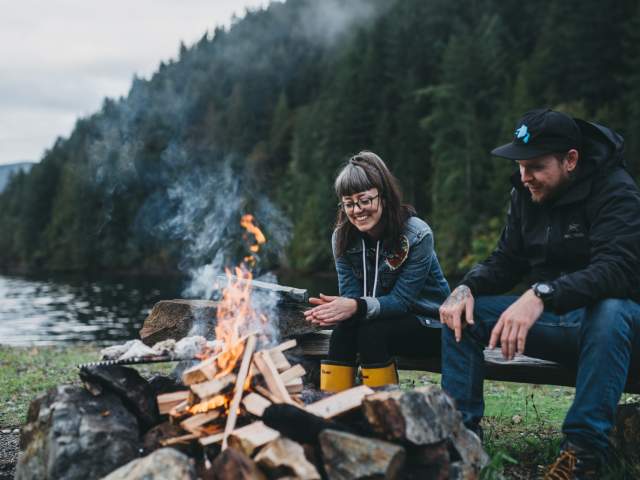Campfires are often thought of as part of the camping experience, but they can also be a hazard. Drier, hotter summers have resulted in significant wildfires in British Columbia. Everyone who visits or lives here has a part to play to prevent the cause and spread of wildfires and ensure that the Sunshine Coast—and British Columbia—is a safe place for everyone to enjoy.
Here are our tips to keep yourself and others safe during camping season:
1. Check to see if there are any active wildfires before your trip.
Since weather conditions can change rapidly, it’s important to verify information from official sources both before you leave and during your trip, so you can make informed travel decisions. Check BC Wildfire Service for current fire bans, @BCGovFireInfo on Twitter, or contact our local Visitor Centres for real-time information about local conditions.
2. Report wildfires.
Spot a wildfire? Report a wildfire by dialing *5555 on a cell phone or by calling 1.800.663.5555 toll-free.
3. Find out if there are any local fire bans before building a campfire.
It's a campers' responsibility to find out which areas, parks, and campgrounds have fire bans and restrictions. If there are no local bans but conditions are rapidly changing, consider this rule of thumb: if the wind is strong enough to carry sparks to combustible material, don’t light a campfire. And never burn a campfire in hot, dry, hazardous conditions.
4. Pick your campfire spot wisely.
Only use a designated campfire pit or construct a containment ring with rocks. Scrape down the dirt one metre around the fire area and remove flammable items, such as twigs, leaves, and needles from the ring. It's always recommended to have at least eight litres of water, a bucket, and a shovel on-hand to properly extinguish your fire. Make sure to build your campfire away from items such as tents, awnings, and camp chairs.
If there is not an existing fire pit, and pits are allowed, choose a site at least 15 feet from tent walls, shrubs, trees or other flammable objects. Beware of low-hanging branches. Choose an open, level location away from heavy fuels such as logs, brush or decaying leaves. Take the wind, and its direction, into account when choosing the site.
At the beach? Select your spot below the high-tide line and make sure to construct your containment ring with rocks.
5. Maintain and manage your fire carefully.
Never use flammable fluids to start a fire; only use a lighter or match and tinder/kindling. Keep your fire small and controlled (large fires can quickly become out of control and are harder to extinguish.)
Don't leave your campfire unattended! Make sure children and pets are supervised near the fire. Consider limiting burning hours; this helps to not only conserve wood but improve air quality and reduces the risk of a wildfire.
When it comes to campfire fuel, please buy and burn firewood sourced locally. It's not recommended to take firewood with you from campground to campground or destination to destination as travelling insects and pests can cause invasive disease in forests.
What should you avoid burning? Don’t use dead wood as it’s an important habitat element for many plants and animals; it also provides organic matter to soil. Items like aerosol cans, pressurized containers, glass, and aluminum cans are dangerous and could shatter or harm you. Never burn garbage, which leaves an unpleasant smell, attracts bears, and adds to air pollution.
6. Extinguish your campfire thoroughly and properly.
If possible, allow the wood to burn completely to ash. Pour lots of water on the fire to drown all embers (not just red ones). Pour until you can no longer hear hissing (and even more for good measure).
With your shovel, scrape any remaining sticks and logs to remove any embers. Make sure that no embers are exposed and still smoldering. Continue adding water, dirt, or sand and stirring with a shovel until all material is cool.
A good rule of thumb: if it's too hot to touch, it’s too hot to leave.
Finally, pack out what you packed in (including any trash) and leave your campsite better than you found it for the next person.
Campfire Alternatives
If having a campfire is not possible, get creative! There are still lots of ways to add ambiance to your camp spot without endangering yourself and others. Use a propane fire pit (check local rules and restrictions around propane fires before you build a fire), get crafty and make a paper crepe fire (a great camping activity for kids), light multiple battery-powered lanterns in the fire ring for that nighttime glow, string up twinkly lights and tell stories or play music, or set up a projector and settle in for a fun, outdoor movie night. It's also fun to turn off any lights, gaze at the stars above you and listen to the calls of birds, owls, and crickets echo around you.

